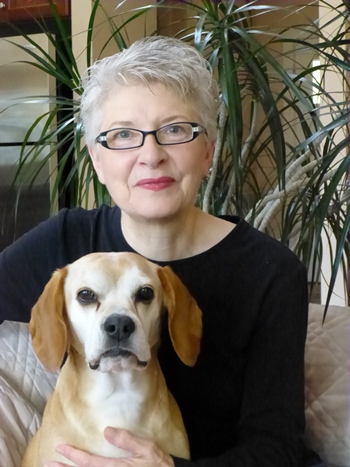–by Gwen Stamm —
Two years ago, while volunteering at the Orcas Island animal shelter, I adopted my first dog. It was love at first sight and these days it is hard to find us apart. Nugget is mostly a beagle so it was not surprising that when I learned of the Beagle Freedom Project, I knew I had to get involved.
The project’s mission is to rescue and find homes for beagles (and other animals) that have been used in laboratory research. Working directly with these labs, The Beagle Freedom Project is able to legally remove and transport animals and place them in loving homes.
Beagles, the most common breed of dog used by university and research facilities, are considered the “ideal” dog because of their friendly and people-pleasing personality. In 2012 nearly 70,000 dogs (96% of them beagles) were used in labs. Most beagles are obtained from commercial breeders who breed dogs specifically to sell to scientific institutions. Ridglan Farms in Wisconsin, one of the top 3 research breeders, has a breeding colony of 750 bitches and 70 studs. According to Jim Burns, the president and CEO, Ridglan housed a total of 3,733 beagles in 2014, netting a profit of $2.5 million.
Testing done on beagles, and other animals, includes research for household products, cosmetics and medical/pharmaceuticals. According to BFP less than 2% of human illnesses are ever seen in animals, and 106,000 people die each year from drugs tested safe on animals. It is the Project’s hope, that with public support, more and more research labs will agree to release their animals instead of euthanizing adoptable pets. Recently, the state of Minnesota enacted into law The Beagle Freedom Bill requiring all research facilities to release their test animals when they are no longer needed. The Beagle Freedom Project supports the passage of similar bills in four other states along with work to implement a federal ban on cosmetic testing on animals.
The Beagle Freedom Project provides several ways to support research animals. They have developed a cruelty-free app which can be installed on your Smartphone. Just scan the bar code of the product you are about to buy and you will learn immediately if animals were used to test the product. You are then able to share your results with your friends and register your concern with companies, sending a message that testing on animals is not acceptable.
The Project has also instituted The Identity Campaign. This campaign allows a supporter to “adopt” a cat or dog that is currently being used in a research facility. As an adopter you give a name and identity to an animal in a research lab. This allows you to tell their story to others which helps people “connect and empathize with the animal on an individual level.” I recently “adopted” two dogs which I have named Bailey and Betsy. They are both under a year old and are research subjects in a lab at Iowa State University. (More information about them will be coming to me soon.) My wish is that they will someday find their way to their forever home. I’m hoping it is sooner rather than later.
Gwen Stamm, a retired ESL teacher from the University of Washington, lives on Orcas full time. She spends much of her free time researching pet issues and advocating for animals.
**If you are reading theOrcasonian for free, thank your fellow islanders. If you would like to support theOrcasonian CLICK HERE to set your modestly-priced, voluntary subscription. Otherwise, no worries; we’re happy to share with you.**









Thanks Gwen for the informative article. I love the picture of you two.
Good article Gwen, and gorgeous picture.
I love Gwen. She’s wonderful